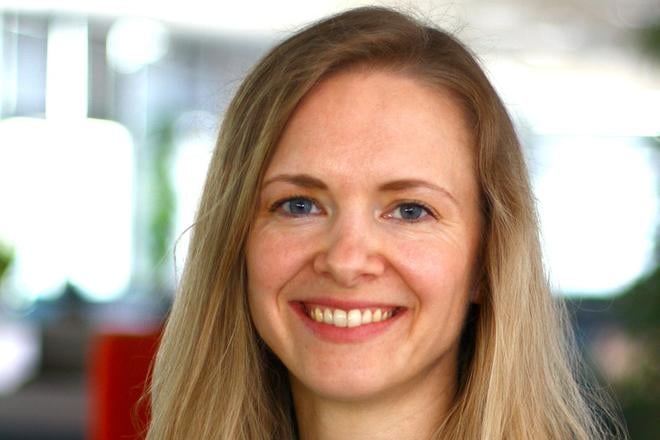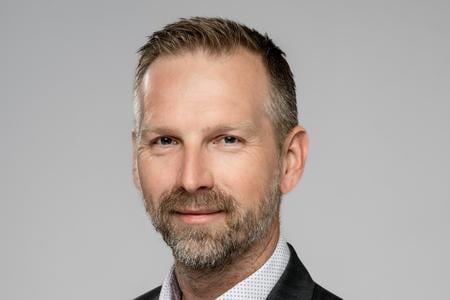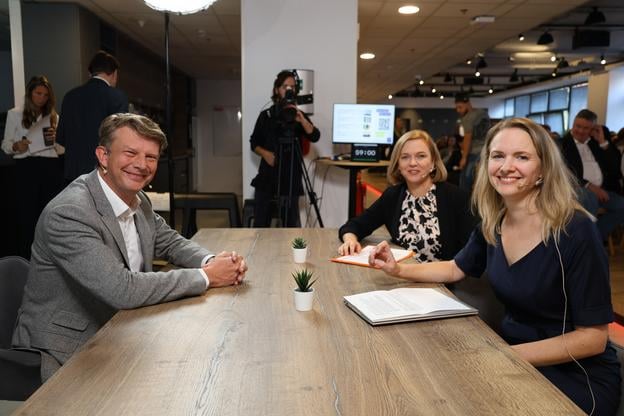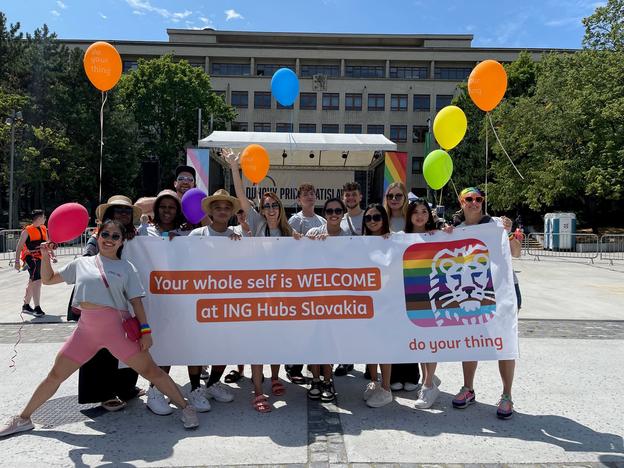While many shared service centres in Slovakia focus on back-office functions, ING Hubs Slovakia stands out by taking on critical roles directly tied to global banking operations. From rigorous due diligence processes to AI-driven innovation, this hub is aiming to set a new standard for financial crime prevention and corporate banking support.
“We don’t sell banking products, but we carry out activities directly linked to banking operations,” explains Zuzana Čerenská, Wholesale Banking Customer Due Diligence Operations Lead at ING Hubs Slovakia. “That’s what makes us unique in the Slovak market. No other bank has an expert centre like this in Slovakia.”
Čerenská leads a team operating not only in Bratislava but also in Manila, Philippines, and in various ING Bank branches. Their primary role is conducting customer due diligence – a thorough background check of new and existing corporate clients of ING Bank.
“My responsibility is to ensure that these in-depth reviews are completed in compliance with regulations and on time,” Čerenská says. The process helps assess whether a client poses a financial crime risk to the bank.
What you will learn in this interview
What makes ING Hubs Slovakia unique compared to other shared service centres in Slovakia?
Why is centralising financial crime prevention important?
How is ING Hubs Slovakia integrating AI into financial crime prevention while ensuring data security?
Why do the top performers in financial risk identification often come from translation and interpreting backgrounds?
What skills are essential for a role at ING Hubs Slovakia?
Could you explain what your role as Head of Wholesale Banking Customer Due Diligence Operations at ING Hubs Slovakia entails?
Our centre in Bratislava is one of five hubs operated by the Dutch ING Bank. The others are located in Manila (Philippines), Katowice and Warsaw (Poland), Bucharest (Romania), and Istanbul (Turkey). Together, we provide services for 40 ING branches worldwide.
I oversee a team of almost 300 people in Bratislava, focusing on corporate banking services, specifically in the area of financial crime risk prevention. Our primary task is conducting customer due diligence, an in-depth assessment of both new and existing corporate clients. Since mid 2024, I have also taken on a global operational role, which includes overseeing teams in Manila as well as those embedded within ING branches worldwide – amounting to around 1,000 people in total.
My key responsibility is ensuring that due diligence is conducted in compliance with regulations and within the required timeframe – typically between three to six months, depending on the complexity of the client. This process is essential in assessing whether a client presents a significant risk in terms of financial crime or money laundering.
What does the due diligence process involve?
Activities and services provided by ING Hubs in Bratislava
ING Hubs in Bratislava employs 1,500 colleagues in Slovakia, offering a wide range of services primarily in corporate banking, with some support for retail banking on a smaller scale. Its operations play a critical role in financial crime prevention through two key activities.
One of these is transaction monitoring for corporate clients, where specific transactions, payments, and other banking activities are reviewed retrospectively to identify any suspicious activity that does not align with the client’s profile.
The second key area is screening, which takes place before payments are processed. This involves assessing whether transactions may be linked to money laundering, terrorist organizations, or sanctioned individuals or entities.
In addition to these essential risk mitigation activities, ING Hubs in Bratislava directly supports clients through the Pan-European Desk. This team provides centralized assistance to global clients, managing their accounts across multiple countries and streamlining processes—such as product setting adjustments—simultaneously across various ING branches.
Furthermore, dedicated teams support the corporate sector with services such as pricing management and specialized solutions, including working capital strategies that enhance supplier-customer relationships.
ING Hubs Slovakia recently won prestigious awards: Top Employer and second place in Najzamestnávateľ.
It’s a fascinating area of work. When assessing corporate clients, we analyse their ownership structures to determine the ultimate beneficial owner (UBO) – the individual who ultimately profits from the business. We conduct multiple checks, for example whether they appear on international sanctions lists or have connections to high-risk jurisdictions.
Based on this analysis, we assess whether a client falls within ING’s risk appetite. If they do, we then classify the risk level, which subsequently determines additional banking procedures, such as transaction monitoring and the frequency of future due diligence reviews.
In essence, we act as gatekeepers for the bank. The process has evolved significantly over time. Twenty years ago, due diligence was far less extensive and sophisticated. Today, it plays a crucial role in financial crime prevention.
Why is it important for banks to centralise financial crime prevention?
Centralisation allows us to detect financial crime trends more efficiently. If a new financial crime pattern emerges in one part of the world, a centralised team can quickly recognise similar activities elsewhere.
This is a key differentiator for ING Bank. Unlike other banks, we take a global approach to assessing clients. ING predominantly serves multinational corporations with branches in multiple countries. Instead of evaluating only their local business in a siloed way, we conduct a comprehensive analysis of their global ownership structures and complete portfolio of related business activities.
For example, if an individual on a sanctions list is linked to 10, 20, or even 30 companies worldwide, our global oversight enables us to identify these connections – an advantage of having a holistic perspective.
Apart from the hub in Manila, are you working with the other hubs in this region?
These are currently more technically oriented. The Polish hub is also focused on anti-money laundering, but they support more retail banking within ING Bank, and then they do what is called transaction monitoring because the bank is obliged not only to find out certain data about clients but also to monitor their individual transactions and other banking operations. The Romanian hub is focused on IT; its operations part is smaller, but growing. There are numerous IT teams who develop new functionalities in the systems, others focus on data. Data cleanliness and quality is very important in general. Quality data, used for data analytics and data mining, is one of the big competitive advantages. Here we are already working on the use of artificial intelligence, and we already have the first projects. Although within banking we are a heavily regulated industry and data protection is one of the important topics. This is one area we are currently working on: how to leverage AI and at the same time not undermine the trust of our clients that their data will be handled in some uncontrolled way.
Can you share any examples of how AI is being used?
One of our pilot projects involves AI-driven data extraction in the due diligence process. A crucial part of due diligence is gathering information from publicly available sources, such as annual reports and corporate registries.
Annual reports often span hundreds of pages, requiring significant time to manually extract relevant details. AI, however, can process and extract key data far more efficiently. Our first step is training AI models to identify and pull relevant information from these documents. There is certainly much more potential in the future.
Do you use AI tools like ChatGPT?
Due to strict data protection regulations, we do not use publicly available AI tools. Instead, ING develops its own customised AI solutions to ensure data security and compliance.
How did the due diligence function come to be based in Bratislava?
The idea of establishing an ING hub in Bratislava emerged around 2008–2009, during the financial crisis. Initially, we focused on back-office corporate banking support for Central European markets, including Slovakia, Czechia, Hungary and Bulgaria. The goal was to centralise operations and achieve economies of scale.
We quickly expanded to support additional European markets, and in 2012, due diligence became part of our service portfolio. At the time, there were concerns about whether we could handle such a complex, highly regulated process. Due diligence is not purely a back-office function – it requires direct client interaction.
If due diligence on a new client is not completed on time, the bank risks losing business opportunities. Additionally, if it is not conducted properly, the bank could face regulatory fines. Over the past 12-13 years, we have proven our ability to manage this process effectively.
How many employees did the Wholesale Banking Customer Due Diligence hub start with?
We began with a team of 10 people. Today, we have 300 colleagues. However, our growth has not only been in headcount – since 2012, financial crime regulations have expanded significantly, making the due diligence process five to six times more complex than when we first started. Corporate ownership structures have also become increasingly intricate, with many companies expanding through acquisitions. This has added a new layer of complexity to our work.
What skills are needed for this role?
Successful candidates are curious, analytical and detail-oriented. They must be interested in understanding corporate structures and identifying financial risks. The work involves sifting through large volumes of documents, scanning them for relevant details rather than reading them word for word.
Interestingly, many of our top performers come from translation and interpreting backgrounds, as they are skilled at extracting and processing information efficiently.
Don’t you require people with a degree in economics or law for these positions?
In Slovakia, there is no specific degree programme for anti-money laundering or financial crime prevention. Some relevant courses exist in law faculties, so law graduates are a potential talent pool.
However, our most successful colleagues – regardless of their field of study – are those who enjoy working with text, analysing information, and making connections.
The roles that we have here are no longer just about the execution of the CDD process, but we also have roles of experts who are involved in developing new systems, who train new adepts and experts who design processes, and improve ways of working. If somebody starts with us as an analyst, as a colleague who actually does due diligence, he/she can move up to more senior roles that are really very creative and help set up the process to make it better and more efficient. Out of our 300 colleagues, at least 50 of them work in these types of non-executive roles and the potential for growth is there going forward.
What are the possibilities for other expert roles to be created in Bratislava?
We have a lot of support from the ING head office to further grow in expert roles, which are often tied directly to process and systems design and transformation, i.e. roles that are focused on improving how the bank operates. With several years of experience in operations, the content knowledge is here. However, these roles require soft skills, which means for example being able to define and present ideas and solutions, convince colleagues either in Amsterdam or in other parts of the world in the team that this is the right solution and why, and last but not least it is important to actively listen and respond to feedback as well as agree on trade-offs. These are not skills that you typically build in operations and our school system does not support them either. So, this is the challenge we address by investing into our colleagues’ capability development to help them become successful candidates for new expert roles. Currently we have more opportunities than colleagues ready to perform these new expert roles.
Who is the ideal candidate for your centre?
The ideal candidate is the one who is willing to learn, who is curious and eager to understand the process of the world of finance and our unique ING culture. He/she is ready to take responsibility and proactively look for solutions and improvements. It is a candidate who is not afraid to step out of his/her comfort zone, who is not afraid to learn from their own mistakes and colleagues’ feedback. An advanced level of English is a must as we are working in a multicultural environment. Working in diverse teams is greatly enriching experience, but also requires a lot of empathy, social and emotional intelligence to effectively collaborate in achieving a common goal.
And in terms of expertise?
What you learn in college will definitely help you in terms of critical and analytical thinking, academic writing, various approaches to problem solutioning, presentation skills, working individually and also in a team and active listening. These are very important prerequisites to be successful, not only at ING, but in other companies as well. But with us, the Dutch culture is really felt. You get plenty of opportunities to speak up and share your ideas. Nobody looks at whether you are from the Netherlands or another ING country, or whether you are 20, 40 or 60 years old, as we are a truly inclusive company. This is really something that is very refreshing, motivating and empowering.





